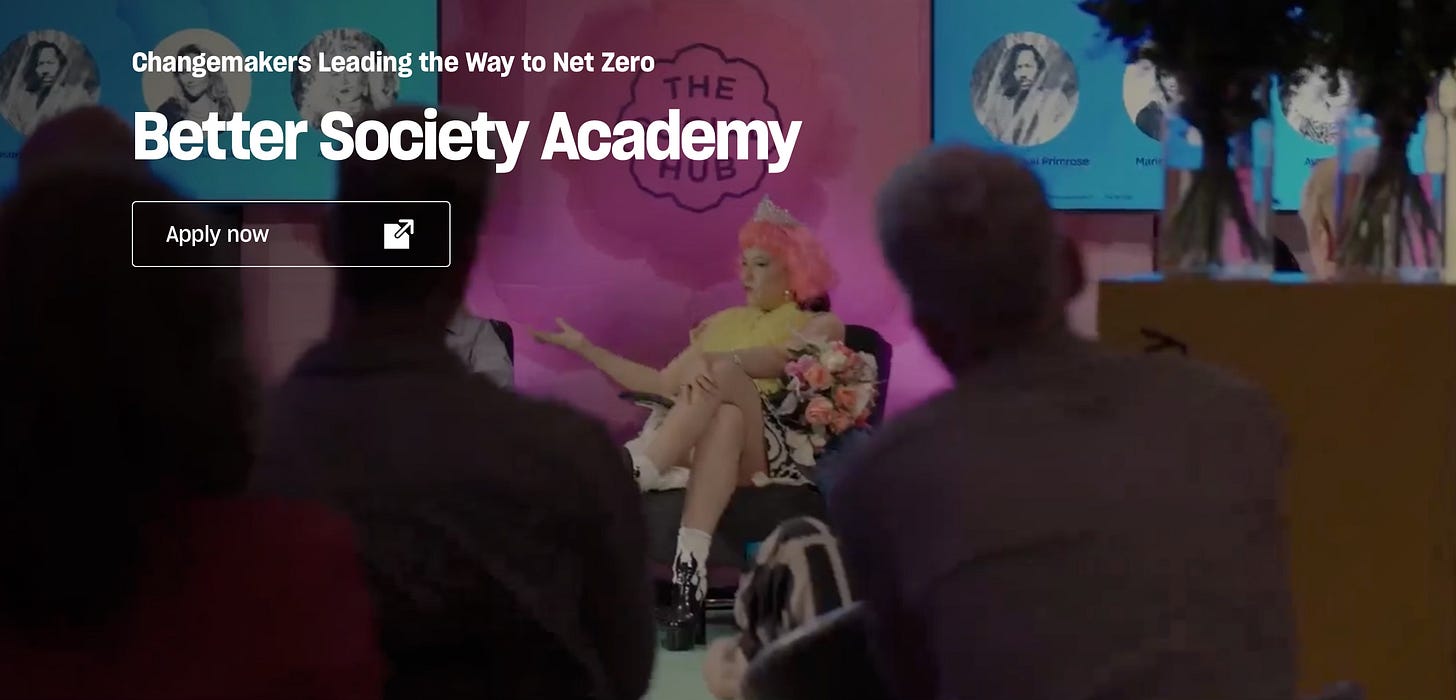Hospitality Reimagined: Aligning Purpose with Profit
As the hospitality industry adapts to rising environmental and social expectations, a clear shift is underway toward models that prioritize purpose alongside profit. This week’s Featured Article explores how hotel and co-working space The Social Hub is setting new standards with its hybrid approach—blending co-living, working, and community engagement with robust sustainability goals. Their journey offers a practical blueprint for aligning hospitality operations with global climate and equity priorities.
On May 2, I will be moderating two panel discussions at The Social Hub in Glasgow’s Better Society Academy, click below for more information!
Our Essential Reads highlight diverse examples of sustainable transformation across the globe—from standardized sustainability pathways for hotels, to cultural and ecological revitalization, and Earth Day innovations in Southeast Asia. These stories collectively show how sustainability in hospitality is no longer niche—it’s becoming standard practice, deeply embedded in business strategy and guest experience.
In the Research Corner, a study from the Journal of Management Studies explores trust and risk perceptions in the sharing economy—insights that are increasingly relevant as hospitality models integrate collaborative, platform-based service structures. Understanding what builds trust can help practitioners design experiences that are not only efficient, but enduring.
Let’s delve into this week’s insights and see how hospitality can continue to evolve with resilience, community, and regeneration at its core.
Featured Article:
In a post-pandemic world, the hospitality industry is being pushed to redefine its role—not just in serving guests, but in contributing to a more sustainable and equitable society. In this Forbes piece, I spotlight The Social Hub (TSH), a Netherlands-based hospitality company that is reshaping industry norms through a hybrid model integrating community, sustainability, and business growth. With locations across 18 European cities, TSH combines accommodation with co-working spaces, event venues, and a social mission—serving students, professionals, and locals alike.
Amber Westerborg, Director of Sustainability & Impact, shares how TSH became one of the largest B Corp-certified firms in hospitality, embracing innovations such as solar energy, AI-powered waste reduction, and food rescue partnerships. Their environmental commitments—like reducing emissions by 78% by 2030—are paired with community investments, including a foundation that donates 1% of annual turnover to educational access. As regulatory pressures such as the CSRD rise, TSH’s strategy may set the tone for how hospitality and real estate can be purpose-driven industries of the future.
Read more: How Hospitality Firm Aims To Blend Sustainability And Community Impact
Essential Reads:
Unified Standards
WTTC and GSTC have partnered to launch a three-stage sustainability framework for hotels, aligning WTTC’s Hotel Sustainability Basics with GSTC Certification. This global initiative offers a clear path for hotels to advance from entry-level sustainability practices to internationally recognized certification, promoting a consistent, credible shift toward responsible tourism.
Read more: WTTC Partners with GSTC to Strengthen Global Hospitality Standards
Planet Promise
S Hotels & Resorts marked Earth Day 2025 with impactful sustainability milestones, from saving bamboo sharks to solar energy adoption. Their eco-friendly amenities, local partnerships, and conservation programs across Thailand and the Maldives emphasize community engagement and green innovation. With a goal of carbon neutrality by 2030, SHR sets a shining example in responsible tourism.
Balanced Growth
Bali's tourism resurgence is driving hotel development, yet sustainability and cultural preservation remain key priorities. Despite lifting a moratorium on new builds, officials and hospitality leaders stress eco-conscious practices, local heritage, and infrastructure upgrades. Initiatives like Nuanu Creative City lead with reforestation and eco-zoning, showcasing Bali’s shift toward responsible tourism growth.
Read more: Bali’s hotels and tourism focus on sustainability, cultural preservation
Sustainable Shift
andCo Hospitality, a Certified B Corporation, has launched as the new parent brand combining The Fold Hotels, The Local, and Legacy Vacation Resorts. Evolving from Legacy Vacation Resorts, this move makes sustainable, eco-friendly tourism more accessible and affordable across the US. Each brand offers unique, community-rooted experiences while sharing a core commitment to responsible travel.
Read more: andCo Hospitality launches, seeking to make sustainable tourism attainable for all
Winter Resilience
As winter approaches, New Zealand’s hospitality sector faces a cautious outlook marked by economic fragility, staffing shortages, and rising costs. However, strategic tourism investments, adaptive business models, and government collaboration offer hope. The Restaurant Association urges bold innovation and resilience, highlighting winter as a true test of operational strength and long-term sustainability.
Read more: Winter outlook in hospo: Cold season reveals sector’s health
Staff Sanctuary
At "Where The Light Gets In" in Stockport, chef Samuel Buckley fosters a culture of care, creativity, and sustainability. From supporting a four-day workweek to investing in calming workspaces and internal promotions, the restaurant prioritizes staff well-being. Despite tight budgets, Buckley proves hospitality can thrive when people, not profits, come first.
Read more: A Restaurant Where The Staff Can Thrive
Research Corner:
Published in the Journal of Management Studies, this research investigates how trust and perceived risk influence customer engagement in the sharing economy, which is seen as an emerging feature for sustainable hospitality. Drawing from over 1,300 survey responses, the study identifies four critical factors: platform reliability, facility quality, shared values, and stakeholder rapport. It also reveals that social identity threats can shape how users evaluate risk and trust. These insights help clarify how businesses can strengthen customer relationships and promote long-term participation in collaborative service models.
Read more: Assessing trust and risk perceptions in the sharing economy: An empirical study
The regenerative business practices and sustainability innovations highlighted in this week's Regenerative Insights directly tackle the critical issues of corporate responsibility explored in my recent book explored in my recent book, The Profiteers: How Business Privatizes Profit and Socializes Cost.
Quick Takeaways:
Affordable eco-travel: Make sustainable tourism more accessible nationwide.
Sustainability roadmap: Use staged frameworks to progress toward global certification.
Legacy upgrade: Combine heritage with modern eco-practices.
Winter readiness: Innovate for seasonal resilience.
Regenerative travel: Focus on community and ecosystem healing.
Staff well-being: Prioritize people over profit.
Eco milestones: Celebrate tangible Earth-first actions.
Balanced growth: Align tourism with culture and sustainability.






